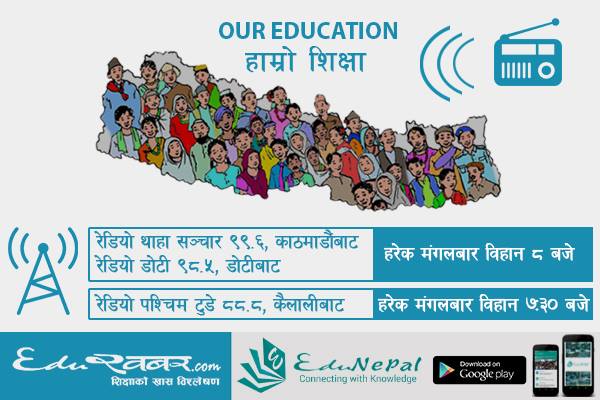
Kathmandu - The new budget presented by the government is bigger in size compared to last year's fiscal estimate however allocation for education has declined by two percent, which experts say is not a correct decision.
The fiscal estimate was tabled by erstwhile government at the parliament last Monday. The size of the budget is Rs. 1,278 billion. Of that amount, financial estimates allocated for education that doesn't fall under the responsibility of local bodies is Rs. 66.12 billion while allocation for education related works to be carried out by local bodies' amounts to Rs. 60.66 billion.
The decline in allocation of budget for education is not a new phenomenon in Nepal. In the current year's budget proposed last year, Rs. 116 billion was allocated for education. The amount was 11.06 percent of the total fiscal estimate that amounted to Rs. 1,048 billion. This year's budget proposed for education is only 10 percent of the total budget. In the past, allocation for education had once reached to an amount equivalent to 18 percent of the total budget.
Experts say that the new constitution entrusts local bodies the authority to run secondary school level education however the current appropriation is based on the same old allocation methods.This was the first budget unveiled after the implementation of the new federal set up through the election of local bodies. Stakeholders have commented that they have no enthusiasm on the proposed budget expenditures.
The budget has allocated Rs 225 billion in total for all actions related to local bodies. The expenditure for education related activities to be undertaken in the local level will also be carried out from this amount. The budget outlines that expenditures including payment of salaries for the secondary level school teachers will be made from this amount. Of the allocated expenditure for local bodies, over Rs. 42 billion will be spent for basic salaries of teachers. Teachers up to grade 10 would be paid Rs. 8.42 billion for salaries.
While announcing the budget, the government mentioned that local bodies would be responsible for education learning grants, evaluation of students, maintaining book corners in class rooms, buying books and stationeries up to secondary level education and scholarship for Dalits and students in remote Karnali zone. The budget also promised enhancing the capacities of schools by implementing school sector development programme. It stressed that a curriculum based technology friendly education will be continued with a special aim to attract children dropping out from schools or without access to primary education. The budget has continued a special programme that aims to mobilise students with a master's degree on technical education in volunteering responsibility. Such youths will work in the local level in promoting technical and social education. The government has also promised invest for production of technical manpower required for short and long term by opening technical skills development centres in the local level. Apart from this, it has promised establishment of an ayurveda university and an engineering and technology academy.
Dr. Pramod Bhatta, a researcher in public education says, 'Every year the responsibility of the government towards public education is increasing, the salaries and pensions of teachers is increasing, however the allocation on education appears declining. It is a worrying trend."
He adds that the decrease in allocation of budget for public education has raised question over the government's commitment to education enshrined in the new constitution.
The budget was presented by former finance minister Krishna Bahadur Mahara in the parliament on the behalf of the caretaker government. Under the provision in the constitution, the government was bound to present the budget in the parliament on May 29. The coalition partners Nepali Congress and CPN-Maoists Centre had earlier agreed with the opposition CPN-UML that no new programmers' will be included in the budget.
(This storyis the part of a radio programme entitled 'Hamro Sikshya' which discusses the opportunities and challenges in public education in the new federal setup. The programme is produced by edukhabar.com with the support of Action Aid Nepal. It is aired from Radio Paschim Today based in Dhangadi, Radio Doti based in Doti and Radio Taha Sanchar based in Kathmandu. The radio programme can also be tuned through this link: http://www.edukhabar.com/audio/28 and also through aneroid app Edunepal.)
प्रतिक्रिया